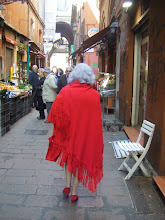
Our first glimpse of the phenomenal Roman amphitheater. Our hotel, the Hotel Riveria, turned out to be within walking distance to every major attraction in the small city of Pula. The city was also very safe, so my sister and I felt secure walking around at night even without the linguistic skills (we relied on my basic Italian instead).

Inside the amphitheater. It only cost about four USD to enter the site, but the experience was worth infinitely more than that. What made this so special was that we were the only two people inside the ruins. When you visit the Colosseum, you are bombarded with tourists at every turn. Here, we had a more authentic experience and were truly able to appreciate the ruins. We probably spent more than two hours inside, marveling at the condition of the building. It was an experience that I will never forget.

The ruins are in such spectacular shape that you are able to walk just about anywhere in the site.

Out of over 200 similar structures, this one is said to be the most complete. Is it any wonder? It was currently under renovation, but I am glad that the Croatian government maintains this treasure as well as it does.

The view from the street. Each time we passed the amphitheater, we stopped to gawk and photograph it. I usually blend in pretty well when traveling in Europe, but this was one occasion where my incessant photo-taking made me stand out as a tourist. I just couldn't stop marveling at the sight of this structure.

The Twin Gates, more wonderfully-preserved Roman ruins.

The Roman theater, directly behind the Archaeological Museum of Istria. These ruins were not as well preserved as the amphitheater. There was no admission charge, which may have been part of it, but there were broken bottles and pieces of glass everywhere. There were also tiny lizards and snails hiding in the rocks, but at least they were there naturally.

Hercules' Gate, located in the center of town.

The amphitheater off in the distance. I'm not sure where we were, but Laura and I wandered on a path through more ruins and followed them until they came to a dead-end near the theater. We thought that the path might have led all the way to the amphitheater, but after climbing up narrow hill-paths, the trail finally ended. It did provide some fantastic views of the amphitheater and harbor, though.

Hotel Riveria (it may appear "fancy," but it was a budget hotel). Upon arrival in the Pula bus station, a woman approached us with a sign that said simply "accommodation." No pictures, no location, no name of the supposed accommodation. Needless to say, we kept looking for other places to stay. We walked into the center of town and I asked a man (in Italian) if there were hotels nearby. He recommended the Hotel Riveria, which was directly behind us. The hotel was absolutely enormous, with few rooms actually in use. We suspected that it might have been a grand hotel one hundred years ago. It was a little run-down, but spacious and clean. The continental breakfast was top-notch though.

No comments:
Post a Comment